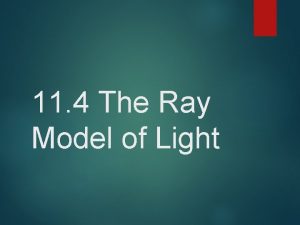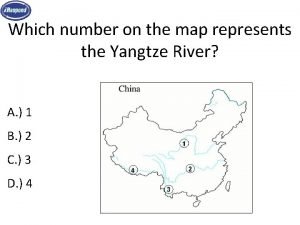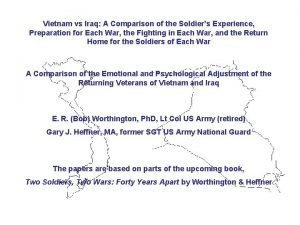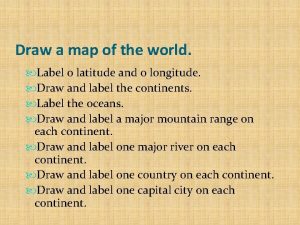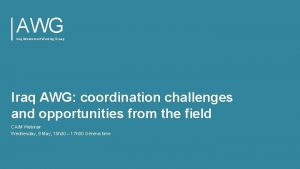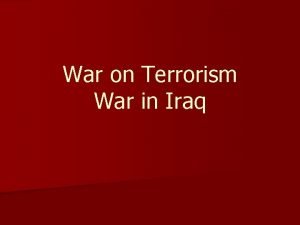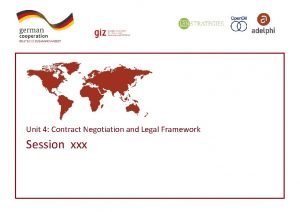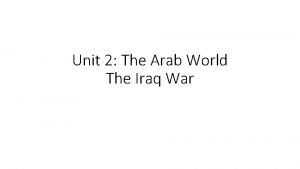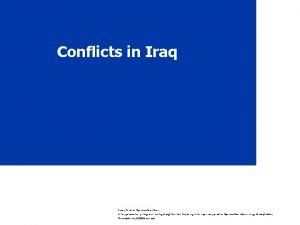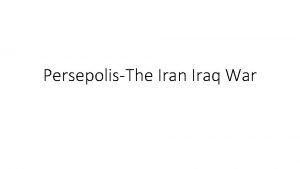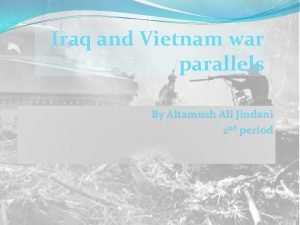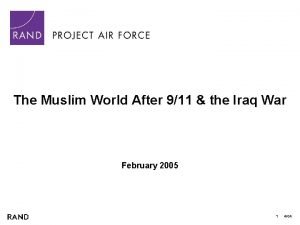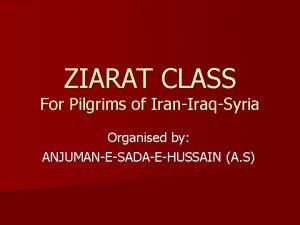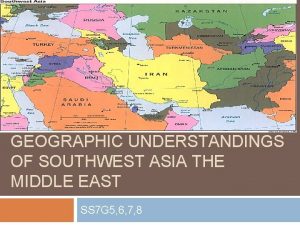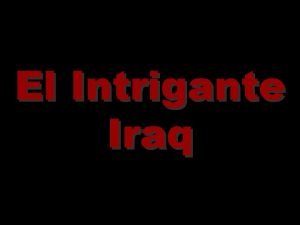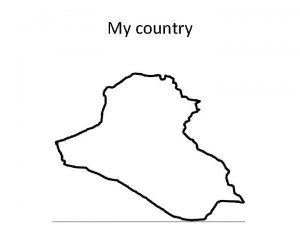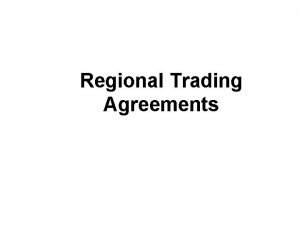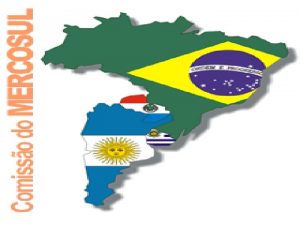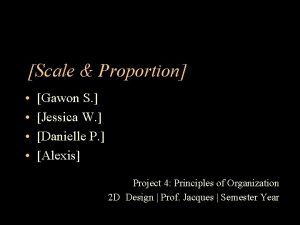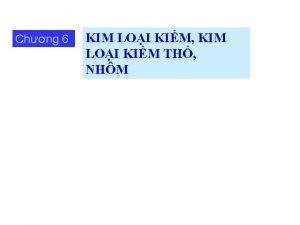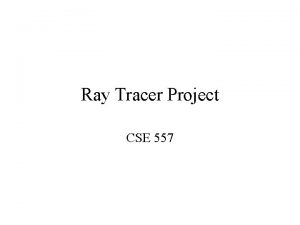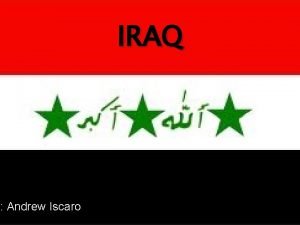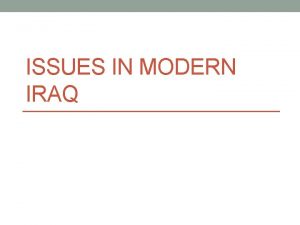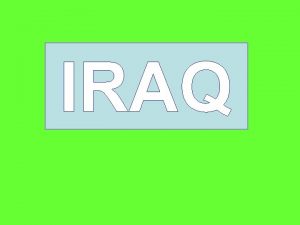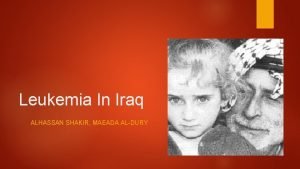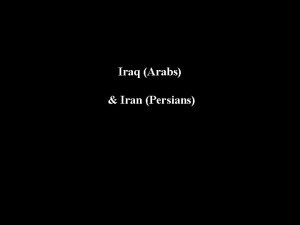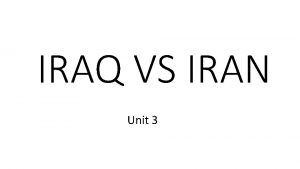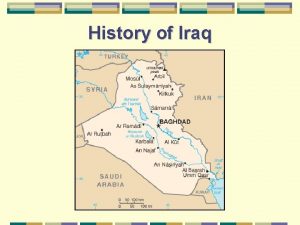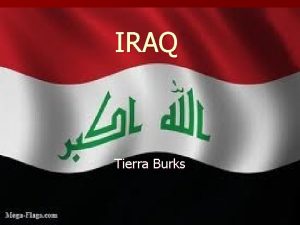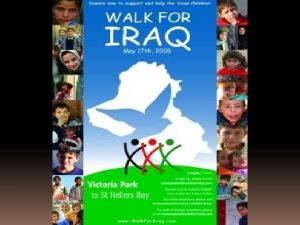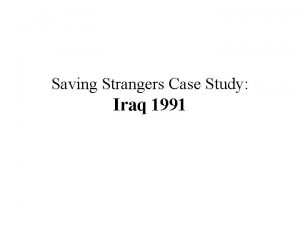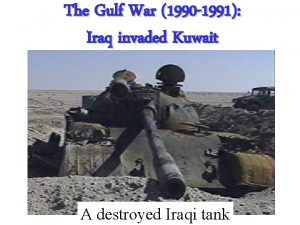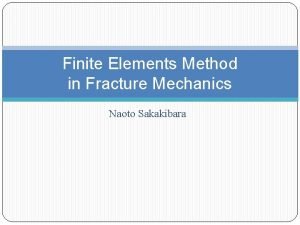Iraq 1991 Gawon Kim Ray Okuno Naoto Ido




























- Slides: 28

Iraq 1991 Gawon Kim Ray Okuno Naoto Ido Muhammad Rameez

Major Ethnic/Religious groups 1. Sunni Arabs 2. Shia Arabs 3. Sunni Kurds

Sunni Arabs • Minority that have ruled Iraq for centuries • 20% of population • Sunni Ottoman control from the mid-16 C up until collapse of empire – governing, military, and administrative experience to continue to control power in 20 C • Half of the Sunni population, lives in urban areas & support secular groups such as Ba’athist

Shia Arabs • Majority of Iraq’s population since 19 C – Many southern tribes converted and became Shiites in protest against Ottoman rule – Mainly reside in Southern Iraq—less developed area • Important religious places for Shiites have been located in Iraq • Continued political and social struggle against Sunnis over distribution of power and wealth in Iraq • Fought with Sunnis as united Arabs in Iraq-Iran War, but contribution forgotten and persecuted • Goal: political and socioeconomic justice

Kurds • • • Largely Sunni Muslim people Ethnic minority group, not religious sect 16% of Iraq’s population No independent state after collapse of Ottoman Empire Turkey, Iran and Iraq each agreed not to recognize an independent Kurdish state • Goal: Independent state

Iraqi Kurdistan Political situation • 1920: Formation of the British Mandate of Iraq • 1946: Formation of the Kurdish Democratic Party (KDP) • Legalised 1960 • 1970: Iraqi-Kurdish Autonomy Agreement of 1970 • 1975: Formation of the Patriotic Union of Kurdistan (PUK)

Kurdish-Iraqi Conflicts 1. Iran-Iraq War (1980~1988) 2. Post-Iran-Iraq War Crackdown (1988~1991) 3. Gulf War (1990~1991) 4. Post- Gulf War

Iran-Iraq War (1980~1988) Causes: 1. Border skirmishes 2. Iranian Revolution Result: 1. Stalemate 2. Status quo ante bellum Key Points: 1. Kurds acted in support of Iran against Iraq 2. Use of chemical weapons 3. Large-scale crackdown of Kurds

Gulf War (1990~1991) Key points: • Invasion of Kuwait • Operation Desert Shield • Operation Desert Storm • Kurdish and Shi’ite uprising Result • Coalition Victory • Withdrawal of Iraqi forces in Kuwait • Establishment of No-Fly zones • Saddam Hussein remains in power

Post-Gulf War (Early 1991) 1. Uprising by Iraqi Minorities • February 1991: As US forces were crushing the Iraqi army and driving it out of Kuwait, George Bush broadcast a message telling Iraqis that there was another way for the bloodshed to stop. • That is for the Iraqi military and the Iraqi people to take matters into their own hands, to force Saddam Hussein the dictator to step aside. . . " • • - Voice of America broadcast. (BBC) March 1991: Intervention first started southern Iraq. Later moved to Kurdish led rebellion in north a week later. Kurdish took control of the Northern part of Iraq Shi’ites in the south took control of major cities in South assuming that the power of Saddam Hussein is weakened.

Post-Gulf War (Early 1991) 2. Retaliation by Iraqi government • Saddam’s Guard units quickly responded by helicopters and tanks against rebellions and unarmed civilians • Forced millions of Kurds and 500, 000 Shi’ites to flee to the mountains. • Saddam took control of major cities by the end of March. • However, continued to attack kurdish people meanwhile being not that harsh towards Shias. • 1000 kurds and shiites were dying everyday.

Post-Gulf War (Early 1991) 3. UNSC Resolutions 688 • France and Turkey took the initiative and brought the issue in Security council on 5 th April 1991. • France claimed that it as a “Duty of intervention. ” • A flow of refugees across border was a threat to security to the neighbouring countries especially. Turkey and Iran. • Termed as a threat to “International peace and security” • A draft resoulution was submitted by France and Belgium cosponsored by UK and USA was adopted as Resolution 688 on 5 th April 1991. • Does not include any phrase which authorizes military intervention, so that it does not get vetoed by China and Russia

UNSC Resolution 688 -Preamble • Clause 3: “Gravely concerned…repression of the Iraqi citizen population in many parts of Iraq, including most recently in Kurdish populated areas…, ” • Clause 4: “Deeply disturbed by the magnitude of human suffering involved, ”

UNSC Resolution 688 Operative Section • Clause 2: “Demands…immediately end this repression…, ” • Clause 3: “Insists that Iraq allow immediate access by international humanitarian organisations…, ” • Clause 6: “Appeals to all Member States and to all humanitarian organisations to contribute to these humanitarian relief efforts, ”

Tipping Point: Media • Western media cover live footages of the crisis • Domestic pressure grew within US and UK • US president Bush and UK Prime Minister Major – Initial response vs Final response (165 -166) • US secretary of State James Baker visits the area and convinces Bush • At first, feared for a Second Vietnam • Gradually changed mind as he saw the emergency situation of the area

Media’s influence on politics Pressured government leaders to take action - Intervention via Resolution 688 - US foreign office trying desperately to convince this action as ‘legal’ Domestic Pressure - Legalization of intervention via international law

Languages used • Bush: ‘Internal/Civil War’ -> wanted to avoid the war between the Kurds and the Shiite • Major: ‘Plight of the Kurds’ -> initially negligent but changed mind • James Baker: ‘Civil War’ -> knows US should not get involved but Immediate actions were required • Sam Nunn (Senate of Foreign relations Committee): ‘Genocide’ -> For the intervention entirely

US/ UN and other countries • US, UK and France violated the UN charter to cause the intervention – No discussion of the appliance of the No- Fly zone had taken place • Concluded that negotiation with the Security Council would not resolve • US had no trust in internal matters of Iraq • French desperate to enter into the fray • Turkey skeptical

Operation Provide Comfort • April 1991: Bush finally decided to go against the Pentagon and ordered the “Operation Provide Comfort” • The no-fly zone was already in place (after the Gulf war) • • Northern: North of 36 th Parallel Southern: South of 32 nd (later 33 rd) Parallel • Purpose: Build, administer and guard Six Safe Havens for Kurdish. • Britain never tried to obtain a Security Council resolution for Safe Havens • 5000 US, 2000 UK and 1000 French troops were among the first who went to set up Safe Havens

Operation Provide Comfort • Saddam Hussein agreed on MOU (Memorandum Of Understanding) allowing access of humanitarian aid organizations. • 100 civilian-run humanitarian centers • By mid-July 1991, the USAF had transported over 7, 000 tons of relief supplies. • UN Secretary-General proposed that allied forces will be replaced by UN police force. • Iraq gave western a exit strategy • Deployment of 500 UN guards allowed to carry personal weapons

Operation Provide Comfort • This decision was criticized by Kurdish leader because 21, 700 highly trained troops were replaced by 500 light armed UN guards. • Britain , after facing huge pressure, decided not leave Iraq until Kurds are at risk. • This put Britain against USA stance. • By mid-July western troops began leaving Iraq after Turkey assurance of creating a rapid air and ground reaction force.

Failures 1. SC response to crisis came too late 2. Unable to provide the humanitarian relief for Shia people in the south. 3. US tried to withdraw troops early, leaving 500 guards instead of 21700 soldiers. 4. The relief system was not effective.

Alternative Choices 1. Iraq should not have been allowed to fly helicopter or fixed wing planes after the surrender of Gulf war. 2. Saddam Hussein should have been arrested or there should have been a criminal offence against him in International court after Gulf war and after attack on Shias and Kurds. 3. Political, Economical and International pressure instead of an immediate and severe sanctions.

Wheeler’s Criteria: Kurds Supreme Humanitarian Emergency Necessity/Last Resort Proportionality Positive Humanitarian Outcome Humanitarian Motives Humanitarian Justifications Legality Selectivity

Wheeler’s Criteria: Shiites Supreme Humanitarian Emergency Necessity/Last Resort Proportionality Positive Humanitarian Outcome Humanitarian Motives Humanitarian Justifications Legality Selectivity

Conclusion • Iraq 1991 changed the context that made Western intervention possible. • Two possible interpretations – Precedent for humanitarian intervention in International law – Special case which occurred in a specific scenario.

Situation Today 1998 Operation Desert Fox: US and UK launch a bombing campaign to destroy Iraq's suspected nuclear, chemical and biological weapons 2003 Iraq War: US-led invasion, unsupported by UN Security Council, topples Saddam Hussein from power

Sources • • • http: //www. pewresearch. org/fact-tank/2014/08/20/who-are-the-iraqi-kurds/ http: //www. washingtonpost. com/wp-srv/inatl/daily/feb 99/kurdprofile. htm http: //countrystudies. us/iraq/38. htm http: //www. theglobeandmail. com/news/world/sunni---shia-divide-explained/article 19337058/ http: //www. islamopediaonline. org/country-profile/iraq/major-religious-communities/sunnis-iraq http: //historynewsnetwork. org/article/1455 http: //www. globalsecurity. org/military/world/iraq/religion-sunni. htm http: //www. bbc. com/news/world-middle-east-14546763 Bbc: http: //news. bbc. co. uk/2/hi/middle_east/2888989. stm http: //www. afhso. af. mil/topics/factsheet. asp? id=19873 http: //global. britannica. com/EBchecked/topic/452778/Persian-Gulf-War
 Emily mayumi okuno do amaral
Emily mayumi okuno do amaral Initial ray definition
Initial ray definition Ray ray model
Ray ray model Ray tracing and ray casting
Ray tracing and ray casting Which number on the map shows the yangtze river?
Which number on the map shows the yangtze river? Iraq food
Iraq food Iraq
Iraq Proper adjective for hungary
Proper adjective for hungary Iraq
Iraq Bcg vaccin cicatrice
Bcg vaccin cicatrice Iraq
Iraq Iraq
Iraq Is iraq a landlocked country
Is iraq a landlocked country Giz iraq
Giz iraq Iraq food
Iraq food Parade
Parade Iraq war
Iraq war Iraq war
Iraq war Rehabilitaded
Rehabilitaded Iraq
Iraq Iraq catering company
Iraq catering company Iraq war
Iraq war Iraq
Iraq What is the relative location of southwest asia
What is the relative location of southwest asia Ziarat bibi masooma qum
Ziarat bibi masooma qum What rivers run through iraq
What rivers run through iraq Iraq
Iraq Iraq
Iraq Iraq
Iraq


